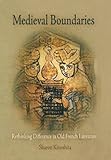Medieval Boundaries : Rethinking Difference in Old French Literature / Sharon Kinoshita.
Material type: TextSeries: The Middle Ages SeriesPublisher: Philadelphia : University of Pennsylvania Press, [2013]Copyright date: ©2006Description: 1 online resource (320 p.) : 11 illusContent type:
TextSeries: The Middle Ages SeriesPublisher: Philadelphia : University of Pennsylvania Press, [2013]Copyright date: ©2006Description: 1 online resource (320 p.) : 11 illusContent type: - 9780812239195
- 9780812202489
- French Literature -- History And Criticism -- To 1500
- French literature -- To 1500 -- History and criticism
- French literature -- To 1500 -- History and criticism
- Provençal literature -- History and criticism
- Medieval and Renaissance Studies
- LITERARY CRITICISM / Medieval
- Cultural Studies
- Literature
- Medieval and Renaissance Studies
- 840.9001
- online - DeGruyter
- Issued also in print.
| Item type | Current library | Call number | URL | Status | Notes | Barcode | |
|---|---|---|---|---|---|---|---|
 eBook
eBook
|
Biblioteca "Angelicum" Pont. Univ. S.Tommaso d'Aquino Nuvola online | online - DeGruyter (Browse shelf(Opens below)) | Online access | Not for loan (Accesso limitato) | Accesso per gli utenti autorizzati / Access for authorized users | (dgr)9780812202489 |
Browsing Biblioteca "Angelicum" Pont. Univ. S.Tommaso d'Aquino shelves, Shelving location: Nuvola online Close shelf browser (Hides shelf browser)

|

|

|

|

|

|

|
||
| online - DeGruyter Dice, Cards, Wheels : A Different History of French Culture / | online - DeGruyter Women in the American Welfare Trap / | online - DeGruyter Western Welfare in Decline : Globalization and Women's Poverty / | online - DeGruyter Medieval Boundaries : Rethinking Difference in Old French Literature / | online - DeGruyter Thinking Through Material Culture : An Interdisciplinary Perspective / | online - DeGruyter A Force Profonde : The Power, Politics, and Promise of Human Rights / | online - DeGruyter Shakespeare's Domestic Economies : Gender and Property in Early Modern England / |
Frontmatter -- Contents -- Introduction -- PART I. EPIC REVISIONS -- 1. "Pagans Are Wrong and Christians Are Right" -- 2. The Politics of Courtly Love -- PART II. ROMANCES OF ASSIMILATION -- 3. "In the Beginning Was the Road" -- 4. Colonial Possessions -- PART III. CRISIS AND CHANGE IN THE THIRTEENTH CENTURY -- Introduction -- 5. Brave New Worlds -- 6. The Romance of MiscegeNation -- 7. Uncivil Wars -- Conclusion -- Notes -- Selected Bibliography -- Index -- Acknowledgments
restricted access online access with authorization star
http://purl.org/coar/access_right/c_16ec
In Medieval Boundaries, Sharon Kinoshita examines the role of cross-cultural contact in twelfth- and early thirteenth-century French literature. Starting from the observation that many of the earliest and best-known works of the French literary tradition are set on or beyond the borders of the French-speaking world, she reads the Chanson de Roland, the lais of Marie de France, and a variety of other texts in an expanded geographical frame that includes the Iberian peninsula, the Welsh marches, and the eastern Mediterranean. In Kinoshita's reconceptualization of the geographical and cultural boundaries of the medieval West, such places become significant not only as sites of conflict but also as spaces of intense political, economic, and cultural negotiation.An important contribution to the emerging field of medieval postcolonialism, Kinoshita's work explores the limitations of reading the literature of the French Middle Ages as an inevitable link in the historical construction of modern discourses of Orientalism, colonialism, race, and Christian-Muslim conflict. Rather, drawing on recent historical and art historical scholarship, Kinoshita uncovers a vernacular culture at odds with official discourses of crusade and conquest. Situating each work in its specific context, she brings to light the lived experiences of the knights and nobles for whom this literature was first composed and-in a series of close readings informed by postcolonial and feminist theory-demonstrates that literary representations of cultural encounters often provided the pretext for questioning the most basic categories of medieval identity.Awarded honorable mention for the 2007 Modern Language Association Aldo and Jeanne Scaglione Prize for French and Francophone Studies
Issued also in print.
Mode of access: Internet via World Wide Web.
In English.
Description based on online resource; title from PDF title page (publisher's Web site, viewed 24. Apr 2022)


